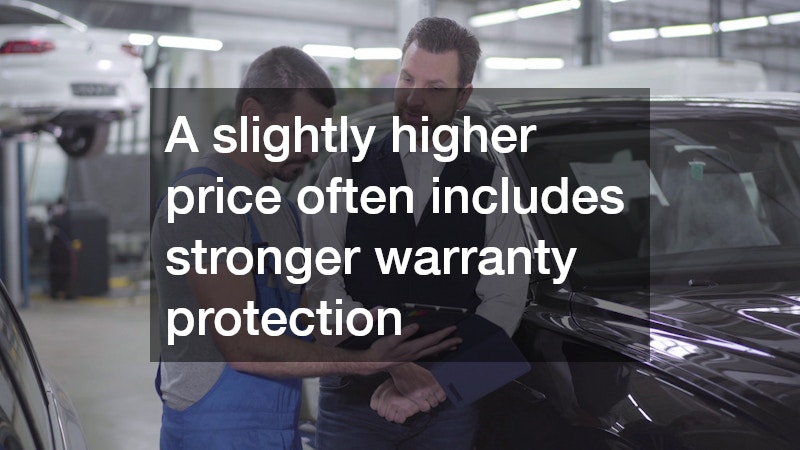Key Takeaways: What to Know Before Asking Your Mechanic for a Price Match
-
Always bring a written, itemized estimate from a verified competitor—verbal quotes or online listings usually don’t qualify.
-
Verify that the parts, labor, and warranty in both quotes are identical before asking for a price match.
-
Approach your mechanic politely and professionally; being informed and respectful increases your chances of success.
-
Price matching works best for major repairs or common maintenance jobs with comparable service scopes.
-
Understand common exclusions, such as online-only deals or non-local competitors, before making your request.
-
If price matching isn’t available, explore alternatives like loyalty programs, bundled services, or seasonal discounts.
-
Always weigh quality, trust, and warranty protection against small cost differences—long-term reliability matters more than short-term savings.

Car repairs can be one of the biggest unexpected expenses in vehicle ownership. Between rising labor rates, fluctuating parts prices, and the cost of diagnostic tests, it’s easy for maintenance bills to grow larger than expected. That’s why many car owners look for ways to save without cutting corners on quality — and one of the most effective yet often misunderstood ways to do this is through price matching.
Price matching guarantees, which started in retail, have become increasingly common among auto repair shops. The idea is simple: if another qualified shop offers the same service for less, your mechanic might agree to match or beat that price. But in practice, it’s not as straightforward as presenting a lower quote. Each shop has its own standards, and not every comparison is fair or valid.
Understanding how price matching works, when to request it, and how to prepare your documentation can help you approach the situation confidently. Below, we’ll go over what you should know before asking your mechanic for a price match — from verifying quotes to presenting them respectfully — along with a clear checklist for your next visit.
Understanding How Price Matching Works in Auto Shops
Price matching is essentially a promise of fairness. A mechanic or service center agrees to offer you the same repair or maintenance service at the same price as a competing shop, provided the competitor’s quote meets certain criteria.
Auto repair shops must account for far more variables than retail stores. While a retail item is identical across sellers, car repairs differ in complexity, part quality, and labor. That’s why a “price match” in auto service always involves comparing like for like.
Several factors influence whether a mechanic will match a competitor’s price:
-
Labor Rates: Technicians with ASE or manufacturer certifications may charge higher hourly rates than general mechanics.
-
Parts Quality: OEM parts cost more than aftermarket or refurbished parts, so shops ensure quotes use equivalent materials.
-
Warranty Coverage: A shop offering a longer parts or labor warranty may not match a cheaper competitor that provides none.
-
Diagnostic Fees and Overhead: Shops invest in specialized tools, software, and training—these factors affect their pricing.
If you bring a competitor’s quote that aligns with these standards, there’s a good chance your mechanic will consider a price match or at least negotiate a fair compromise.
Why Mechanics Offer Price Matching
While many car owners assume price matching hurts a shop’s profits, the opposite can be true. In competitive markets, a price match can help mechanics maintain customer loyalty and attract new clients who might otherwise go elsewhere.
Mechanics and service centers often offer price matching to:
-
Build long-term trust: A transparent approach to pricing strengthens relationships with customers.
-
Stay competitive with dealerships: Independent shops use price matching to counter dealership labor rates and keep business local.
-
Encourage repeat visits: Once a customer sees fairness in pricing, they’re more likely to return for future repairs.
-
Promote service transparency: Reviewing quotes side by side allows mechanics to explain real differences in parts or warranty value.
Ultimately, price matching isn’t just about lowering the bill — it’s about showing that a shop values your business enough to prove its fairness.
When Price Matching Makes Sense for You
There are times when asking for a price match is worth the effort — and times when it isn’t. Understanding the difference can save you both frustration and money.
When It’s a Smart Move:
-
High-cost repairs: For big jobs like brake replacements, alternator repairs, or timing belt changes, even a small percentage discount can lead to substantial savings.
-
Routine maintenance: Price matching works well for standard services such as oil changes, tire rotations, and fluid flushes where pricing is more uniform.
-
When you’ve compared multiple quotes: If several local shops offer similar services at different prices, it’s fair to ask your preferred mechanic to match the best rate.
When to Think Twice:
-
The competitor uses cheaper or uncertified parts.
-
The savings are small compared to the trust and quality you already get from your current shop.
-
Your shop includes additional value, like a free follow-up inspection or extended warranty coverage.
In many cases, it’s better to pay a slightly higher rate to a mechanic you trust than chase the lowest offer from an unfamiliar shop.

What to Bring When Asking for a Price Match
Preparation is the key to success when it comes to price matching. Walking in with the right documentation and information shows professionalism and helps your mechanic assess the situation quickly.
Here’s a comprehensive checklist of what to bring:
-
A Written Estimate from the Competitor
Make sure the quote is official and itemized, listing labor hours, part names, quantities, and the total price. Handwritten notes or vague online posts usually won’t qualify. -
Your Vehicle Information
Bring your VIN, make, model, year, and mileage. Mechanics need this to confirm both quotes refer to the same vehicle and service requirements. -
Part Specifications
Note the part numbers, brands, and types (OEM, aftermarket, or remanufactured). Matching quality ensures a fair comparison. -
Proof of Validity
Keep a dated, printed copy or screenshot showing the competitor’s name and contact details. Avoid expired promotions or limited-time coupons. -
Your Original Estimate
Bring your mechanic’s quote so both can be compared side by side. Highlight any price discrepancies — whether in parts, labor, or warranty coverage.
Having this documentation makes the process straightforward and demonstrates that your request is informed and legitimate.
How to Verify Competitor Quotes Before Presenting Them
Before walking into your mechanic’s shop with a lower quote, make sure that quote holds up under scrutiny. Some competitors use vague or incomplete pricing that doesn’t reflect the true cost of the job once all fees are included.
Here’s how to verify a quote properly:
-
Compare identical services: Check that both estimates list the same repair procedure and labor time.
-
Confirm part quality: Verify whether both shops use OEM or equivalent-grade aftermarket parts.
-
Check for hidden fees: Some shops omit taxes, environmental fees, or disposal charges that will appear later.
-
Review warranty coverage: A shorter or nonexistent warranty could make the lower quote less valuable.
-
Validate the shop: Ensure the competitor is licensed, insured, and certified — otherwise, the quote may not qualify for matching.
Taking the time to vet competitor quotes protects you from surprises and helps your mechanic take your request seriously.
How to Approach the Conversation with Your Mechanic
Asking for a price match can feel awkward, but it doesn’t have to be. A respectful, honest approach usually works best. Mechanics are professionals who appreciate well-informed customers who understand what goes into their work.
When you’re ready to bring it up, be straightforward and polite. You might say something like:
“I really like the work your shop has done for me, but I found a quote from another local garage that’s a bit lower for the same repair. Could you take a look and see if you can match or come close to it?”
That tone is friendly, collaborative, and respectful — it opens the door for discussion rather than confrontation.
Additional Tips for a Successful Conversation:
-
Start with appreciation for their past service.
-
Present your documents neatly and clearly.
-
Avoid comparing your mechanic to “cheap shops” or using threatening language.
-
Mention that you value quality and long-term service, not just price.
-
Be flexible — even if they can’t match the quote exactly, they may offer a discount or add value elsewhere.
Remember, your goal isn’t to “win” a negotiation but to find fair, transparent pricing that benefits both sides.
Common Exclusions and Limitations in Price Matching
Even with the best preparation, not every quote qualifies for a price match. Auto repair shops have specific rules to prevent unfair or misleading comparisons.
Typical exclusions include:
-
Online-only or mail-order prices from retailers without local installation services.
-
Non-local competitors outside the shop’s service area.
-
Promotional or coupon-based discounts that apply only under special conditions.
-
Quotes using refurbished or uncertified parts.
-
Handwritten or unverifiable estimates lacking full details.
Mechanics aren’t being unreasonable when they decline these requests. These policies exist to protect both the shop and the customer from unrealistic or unsafe comparisons. However, you can always ask if they’re willing to offer a partial match or a future service discount instead. Many reputable shops appreciate your honesty and effort enough to meet you halfway.
Balancing Cost, Quality, and Trust
In the end, the best repair deal isn’t always the cheapest. A mechanic’s skill, reliability, and willingness to stand behind their work are worth more than saving a few dollars.
When deciding whether to push for a price match, consider the full picture:
-
Experience and certification: Mechanics who continually train and hold ASE or manufacturer credentials deliver consistent, reliable service.
-
Warranty terms: A slightly higher price often includes stronger warranty protection.
-
Customer service and communication: A mechanic who takes time to explain your options provides real long-term value.
-
Convenience and trust: Working with someone you know and trust can prevent miscommunication and costly repeat repairs.
Use price matching as a tool for fairness, not a bargaining weapon. The goal is to make sure you’re paying a fair price for quality work — not forcing a shop into an unrealistic deal.
Alternative Ways to Save if Price Matching Isn’t Available
If your mechanic doesn’t offer price matching or your request doesn’t qualify, you still have several ways to cut costs responsibly without sacrificing quality.
Consider these practical alternatives:
-
Loyalty programs: Many shops reward repeat customers with discounts, free inspections, or oil changes after a set number of visits.
-
Bundled service packages: Combining multiple maintenance jobs, like a brake service and tire rotation, often reduces total labor costs.
-
Seasonal promotions: Look out for winter tune-up specials or summer AC service deals.
-
Customer-supplied parts: Some mechanics let you bring your own parts (like a replacement battery or air filter), though warranty terms may vary.
-
Diagnostic credits: If you approve the repair after a diagnostic test, ask whether the diagnostic fee can be credited toward the final bill.
-
Local training programs: Automotive schools sometimes perform repairs at a lower rate under certified instructor supervision.
Even without an official price match, being proactive about your options can yield meaningful savings over time.
Final Checklist: Preparing for a Successful Price Match
Before approaching your mechanic, use this quick recap to make sure you’re fully prepared:
-
Get a written, itemized quote from a certified competitor.
-
Confirm both estimates cover identical services, parts, and warranties.
-
Bring your vehicle details (VIN, make, model, mileage).
-
Present valid proof — dated, official, and clear.
-
Stay respectful and open during the conversation.
-
Be ready to consider partial matches or loyalty incentives.
-
Weigh overall value, not just the lowest number.
Following this checklist will help you approach the situation confidently, showing your mechanic that you’re an informed, reasonable customer.
Smart Car Owners Know When to Ask—and When to Walk Away
Price matching can be a powerful way to ensure you’re getting a fair deal on car repairs, but only when done right. It’s not about squeezing your mechanic for every penny — it’s about making sure you’re paying a reasonable rate for quality, trustworthy service.
By preparing your documents, verifying competitor quotes, and approaching the conversation with professionalism, you can often save money while maintaining a good relationship with your mechanic. And when a shop can’t or won’t match a price, you’ll still have the confidence to know whether to accept, negotiate, or look elsewhere.
At the end of the day, being an informed car owner is about more than finding the lowest price. It’s about understanding value — the balance between fair pricing, reliable workmanship, and peace of mind. Use price matching as a tool to achieve that balance, and you’ll not only save money but also build a lasting partnership with a mechanic you can trust.
